
Stem cells may offer hope for children with Hurler syndrome
USC medical team discovers long-term solutions to problems associated with the rare genetic disease
A new therapy involving stem cells may offer a better quality of life for patients with Hurler syndrome, a rare genetic disease that can cause crippling physical conditions and lead to early death.
In work with mice, Toshio Miki of the Keck School of Medicine of USC and his team discovered that transplanting human placental stem cells can offer a long-term solutions to problems linked to the syndrome.
The disease leaves the body without a vital enzyme that breaks down large molecular building blocks of bones and tissue. When these large molecules build up, they can damage organs and cause a host of problems, including a degeneration of brain functions, heart problems, impaired hearing and vision, loss of coordination, breathing difficulties, abnormal joint and bone growth, stiff joints, and a thickened skull and facial features.
Without enzyme replacement therapy or a blood or marrow transplant, children born with Hurler Syndrome usually die before they reach age 10.
In Miki’s study, done with the support of the California Institute for Regenerative Medicine, transplanting healthy stem cells directly into the livers of newborn mice resulted in significant restored enzyme function for more than 20 weeks.
The mice that received stem-cell transplants had better coordination than those that didn’t, and also had greatly reduced issues with bone development and joint stiffness.
Researchers even noticed that mice that received transplants were more likely to engage in normal grooming behavior and interact with their cage mates.
Miki’s work is especially promising since it involves human placental stem cells, which are readily available.
